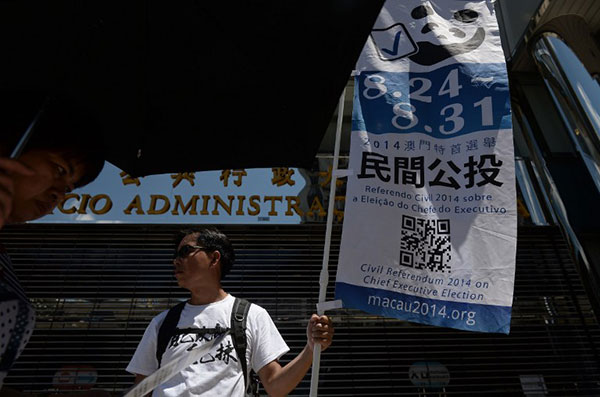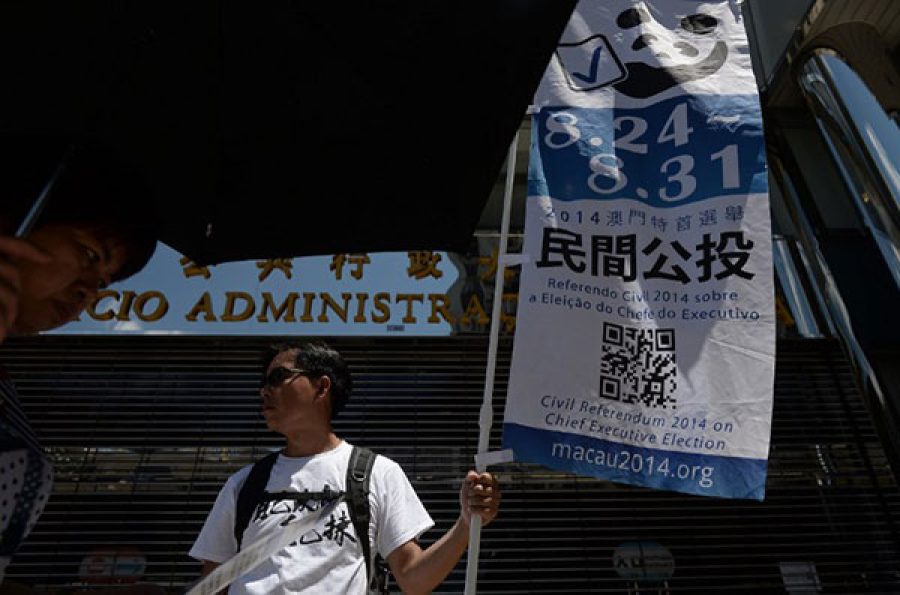Four “civic referendum” activists were taken in for questioning by Public Security Police (PSP) officers yesterday in Rua de S. Lourenço, shortly after they had begun the controversial street poll. One of them was New Macau Association (NMA) Vice President Scott Chiang Meng Hin.
Political activist Jason Chao Teng Hei was also taken in for questioning by Judiciary Police (PJ) officers yesterday afternoon. Chao is a member of the Open Macau Society, one of the three co-organisers of the “civic referendum,” along with Macau Conscience and Macau Youth Dynamics.
The street poll, which the government says is illegal and invalid, took place in Rua do Campo, Rua de S. Lourenço, Avenida de Horta de Costa, Iao Hon and Taipa, with plain-clothes police officers present at the latter three locations, telling the activists to stop the poll.
As a result, the organisers of the “referendum” decided to scrap the e-vote at the five locations yesterday. However, online voting for the “civic referendum” continued.
At around 11 a.m., several officials from the Office for Personal Data Protection (GPDP) showed up in Rua do Campo, handing a notification to Chao requesting him to stop collecting personal data from residents. Chao acknowledged receipt of the notification by signing it.
For verification purposes, “referendum” voters needed to enter their ID card numbers, the last seven digits on the top line and the first seven digits on the middle line at the back of their ID cards. They also needed to submit their Macau mobile phone number before voting.
Chao said he disagreed with GPDP, insisting that the activists were following the law and that the notification was just another way for the government to “suppress” their activities.
Lawmaker Antonio Ng Kuok Cheong, who took part in the e-vote, said the public should understand that the GPDP was probably working under the directive of the higher echelons of the government, adding that on a positive note it showed that the government is concerned about the methods private entities use to handle the public’s personal data.
Shortly after midday, Chao told reporters he had been told that four activists were taken in for questioning by the police. He then decided to stop the street poll since officers had also taken away their tablet computers used for the e-voting.
The PSP said in a statement the four activists were taken in for questioning because they refused to obey the police’s order to stop gathering personal data.
“They [the police] claimed that it is illegal to collect citizens’ information, but they [voters] voluntarily offered that information to us,” Chiang told reporters. “They [police] said they are inviting us… taking us to the station to file a report.”
The PSP, PJ and GPDP held a joint press conference yesterday afternoon, in which GPDP Deputy Director Yang Chongwei reiterated the government’s stance that gathering personal data for the “civic referendum” is illegal.
PJ spokesman Choi Iat Peng said the police took Chao in for questioning after receiving a tip-off from the GPDP about the “civic referendum” website, saying the act of collecting people’s data on that website was illegal as well.
The five activists left the respective police stations yesterday evening. In a phone interview with The Macau Post Daily shortly afterwards, Chao lashed out at the police, calling their action a “human rights abuse”.
Chao said he was surrounded by several PJ officers as he left a public bathroom in Sao Francisco Garden and was then taken to the PJ headquarters in Zape for questioning.
He said that while online voting would go on, the organisers would announce later if they will hold another street e-vote on August 30 as originally planned.
As of midnight, there were 4,275 residents who had voted in the “civic referendum,” according to its website.
The residents were asked to answer two questions – if they want to have universal suffrage for the chief executive election in 2019 and if they have confidence in Chui Sai On. (macaunews/macaupost)






